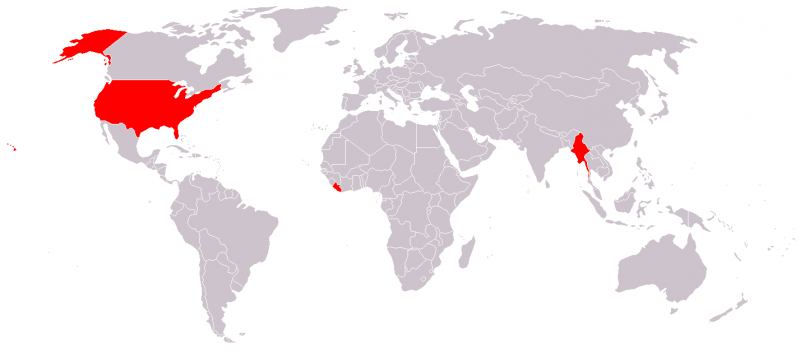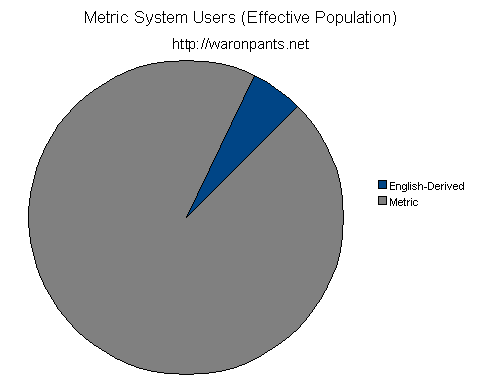Everyone Measures in American
Over-generalization irritates me. One infuriating example is when someone factually states, "Everyone thinks that (insert person's individual and/or under researched opinion here)."
I almost always call the person out on it under the guise of genuine interest. "Really? Where did you hear that?" "I never knew that. My news feeds usually say the opposite." Sometimes, sarcastically, I would ask, "Who did your research?"
My job involves scientific research. Science uses the SI system of measurement, more commonly referred to as "the metric system." At work, everything is measured in meters, kilograms, and degrees Celsius. On occasion I forget to switch modes when I get home from work. That led to this actual conversation:
(I'm trying to give the truck driver with my new furniture directions to my apartment.)
Me: Do you know where Tesla's Tavern is?
Driver: Yeah.
Me: Just park by there. I'm next door.
Driver: How far are you from the Tavern?
Me: I'm literally next door. If I walk outside, I'm literally five meters from their door.
Driver: Meters? What the fuck does that mean?
It was not a pleasant day. Also, I replaced the real restaurant name with "Tesla's Tavern." As far as I know, that doesn't exist. It really should, and it would be amazing. That conversation made me start thinking, "Just how widespread is metric? Shouldn't people at least have a clue how long five meters is?"
I looked it up on Wikipedia. Only three countries do not officially use the metric system: the United States, Liberia, and Burma. Years later, this is still true as mentioned recently on Gizmodo. Gizmodo links to the same map I found on Wikipedia.

Fast forward to the near present. A friend and I were talking about GURPS. For those who don't know about GURPS, just know that it's a board game in which the board is a map laid out as a bunch of hexagons. GURPS suggests that each hexagon should be 1 inch wide and to use a scale of 1 inch = 1 yard.
My friend was looking up campaign ideas for his game and found a website with ideas he liked. The problem was that the site used metric units. This frustrated him.
Friend: How am I supposed to use this!? What scale is this even in?
Me: My guess is probably 25mm per hex. Each hex is probably a meter.
Friend: *confused look* What makes you say that?
Me: There's 25.4mm in an inch, and a yard and a meter are about the same.
Friend: *getting angry* You know what? Fuck the Brits! I'm not using this shit. Everyone uses feet and inches. Why is that so hard for them?
Me: Well, maybe in America everyone does...
Friend: Bullshit! Name one country that uses metric besides England.
Me: Umm... All of them except three. Also, there's a conversion table in the front of the GURPS manual.
To my knowledge, he hasn't played GURPS since. I've gone on to find that most people don't seem to really know what a yard is, either, other than "there's a hundred of them in a football field."
As for the "Everyone uses feet and inches" comment, that's just plain wrong.
- "Brits" and "English" are not interchangeable.
- According to the map, the British don't use feet and inches.
- Point 3 is the below unnecessary math.
I was curious to find out just how many people "everyone" includes.
How many people do not use the metric system?
According to the mentioned Gizmodo article, only Burma, Liberia, and the US don't use the metric system. Upon further research, I found that Burma and Liberia DO use it; they just never declared an official measurement scale at all. I wanted a credible source, though, and finally found one: the CIA.
Also, in my research I found that Canada, Australia, and the UK all still partially use pounds, ounces, etc. Because there is some slight variation among them all, for semantics I'm going to refer to these systems as "English-derived units."
As of March 28, 2011 (when I originally wrote this article), Wikipedia lists the relevant populations as follows:
| World | 6908500000 |
| Do not use (officially) metric | |
|---|---|
| US | 311058000 |
| Myanmar (Burma) | 50496000 |
| Liberia | 4102000 |
| Partially use metric | |
| United Kingdom | 62041708 |
| Canada | 34399000 |
| Australia | 22603000 |
Let's add up how many people effectively use English-derived units. This means that I'll scale the "partial" countries to 50% and eliminate Burma and Liberia.
| Country | Population | Scaling Factor | Effective Population |
|---|---|---|---|
| Uses English-derived units | |||
| USA | 311058000 | 100% | 311058000 |
| 0% | 0 | ||
| 0% | 0 | ||
| Partially uses English-derived units | |||
| United Kingdom | 62041708 | 50% | 31020854 |
| Canada | 34399000 | 50% | 17199500 |
| Australia | 22603000 | 50% | 11301500 |
| Total | 370579854 | ||
| World Population | 6908500000 | ||
| Percentage of Total World Population | 5.36% | ||
That means about 5% of the world uses English-derived units. Using the table's data, here's how that looks as a pie chart.

1/20 of the world is not "everybody." The only reason the proportion is so high is because the US is 4.5% of the world's population.

84% of all English-derived unit users live in the US. So, next time you're on the World Wide Web, America, and you find a recipe that measures everything in grams, think for a minute before cursing at it. Only 0.9% of the world outside of the US knows what an ounce is.

